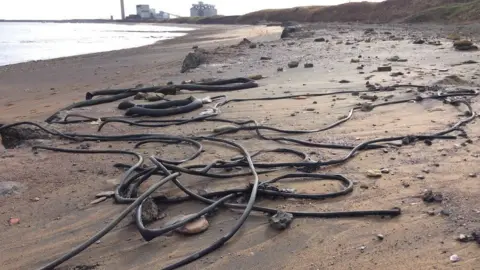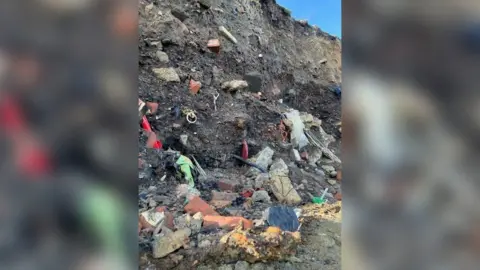Beach clean-up sees 70 years of waste removed
 Steve Lowe
Steve LoweThe removal of 70-years' worth of industrial waste polluting a beach has been completed.
The £5m scheme to clean-up Lynemouth, in Northumberland, was brought about after coastal erosion caused waves to expose a former colliery landfill.
Samples of the previously buried debris found it could be harmful to people and was in danger of washing into the sea.
Funded by Northumberland County Council, the work began in 2023 and had initially been due to be finished by autumn last year.
Contractor BAM Nuttall announced it had cleared 1,000 tonnes of hazardous and non-hazardous materials including asbestos, hydrocarbons, rubber and plastic, and processed 95,000 tonnes of colliery soil.
Much of the waste originated from the early 1900s, when Ellington and Lynemouth collieries tipped waste on to the Lynemouth foreshore and artificially extended the coastline to the sea.
'Horrible rubbish'
Gareth Farrier, BAM Nuttall's Northern region director, said the stretch of coastline had been transformed into "a safer and cleaner environment – one that the local community and wildlife can once again enjoy."
Councillor Glen Sanderson, leader of the Conservative-led authority, said the waste had "caused serious problems for a long time".
"Lynemouth beach is the result of lots of dumping of waste, some not very nice, in the sand dunes.
"As the tides have changed they have washed away the covering and exposed vast quantities of horrible rubbish which has found its way onto the beach."

Councillor Liz Dunn, of Labour and who represents the Lynemouth ward on the county council, welcomed the news and said "it has been a long time coming".
"From the initial efforts of residents raising their concerns, it has come to fruition," she continued.
"It is an improvement not just for Lynemouth but for the rest of the coast as well."
Where possible rock, brick and stone was removed from the colliery spoil so that it could be used to backfill the excavations and restore the land to its near-original profile, according to the Local Democracy Reporting Service.
